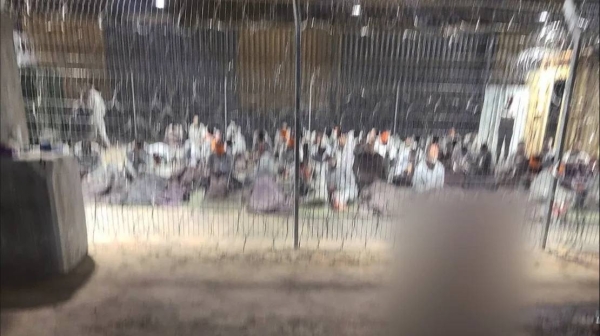
Officials in Palestine have welcomed the UN’s appeal to Israel to end the administrative detention of Palestinian detainees.
Qadri Abu Bakr, head of the Prisoners and Ex-Prisoners Affairs Commission, lauded the UN move.
He told Arab News that the Palestinian Authority has made similar appeals for several years and has repeatedly urged international organizations and allied countries to pressure Israel into ending the detention practice.
Israel uses administrative detention — imprisoning a person without trial for a period of six months — to clamp down on Palestinian activism, Abu Bakr said.
He lamented that some prisoners had spent almost eight years in administrative detention without trial because detention orders were renewed every six months.
Stephane Dujarric, spokesperson for the UN secretary-general, said in a press conference that the UN had repeatedly called on Israel to end the practice of administrative detention, either by releasing or prosecuting detainees.
Dujarric added that the UN was following up on the case of Salah Hammouri, a Palestinian lawyer held by Israel without charge under administrative detention.
The spokesman’s remarks came after independent experts had called on Israel to immediately release Hammouri, who recently ended a 19-day hunger strike in objection to the systematic policy of administrative detention.
Dujarric added: “We are closely following the situation of Mr. Hammouri and other Palestinian administrative detainees held by Israel.
“We are aware that there are about 30 detainees, including him, who recently ended their hunger strike, which had been going on since September. And obviously, we have repeatedly called for Israel to end the practice by either releasing people or charging them when there are grounds to do so.”
Israeli retaliatory measures against Hammouri escalated after following his work with the Conscience Foundation for Prisoner Care and Human Rights.
UN experts also expressed their deep concern about the widespread misuse of administrative and criminal law procedures by Israel, and its use of confidential information against Palestinians, including Hammouri.
Abu Bakr said that there are 780 Palestinian administrative detainees, including at least six minors and two female prisoners. Most of the detainees are held in the Negev and Ofer prisons.
Since 2015, Israeli authorities have issued more than 9,500 administrative detention orders.
Since the beginning of this year, authorities have issued about 1,365 administrative detention orders, including 272 in August alone.
Since late 2011, prisoners in Israel have carried out more than 400 individual strikes.
Abu Bakr said that the prisoners have repeatedly demanded that Israeli authorities bring them to trial.
In a separate development, Israel reportedly intends to allow the Palestinian Authority — for the first time since 2001 — to acquire two civilian helicopters for high-level flights in a move aimed at enhancing President Mahmoud Abbas’ position.
Haaretz reported that Israeli security leaders had objected to such proposals for years on the grounds that the helicopters would be used for smuggling purposes, as happened under former Palestinian Authority chairman Yasser Arafat.
According to the report, Israeli security officials recommended that the government accept the request of President Abbas as part of steps to strengthen his position within the Palestinian Authority.
According to the plan’s draft, Israel intends to allow the Palestinian Authority to buy two helicopters with money donated by Gulf states.
The two helicopters would be stationed in Jordan, and will remain on standby to transport senior officials from the Palestinian Authority.
The Palestinian Authority will be required to request a flight permit when traveling through Israeli airspace, which includes the occupied West Bank.
PA officials currently rent helicopters belonging to the Royal Jordanian Air Force to transport themselves and diplomatic guests between Ramallah and Amman.
Each flight costs them about $100,000, though President Abbas owns a private jet stationed in Amman for his trips around the world.
Israel allowed the late president Arafat to acquire three Soviet-made Mil Mi-8 helicopters following the Oslo Accords signed between Israel and the Palestinian Authority in 1993.
However, then-Israeli PM Ariel Sharon ordered the helicopters to be destroyed during the outbreak of the Second Intifada in 2000 after they were allegedly used to smuggle weapons and wanted criminals.
The helicopter pads in both Ramallah and Gaza were destroyed.











